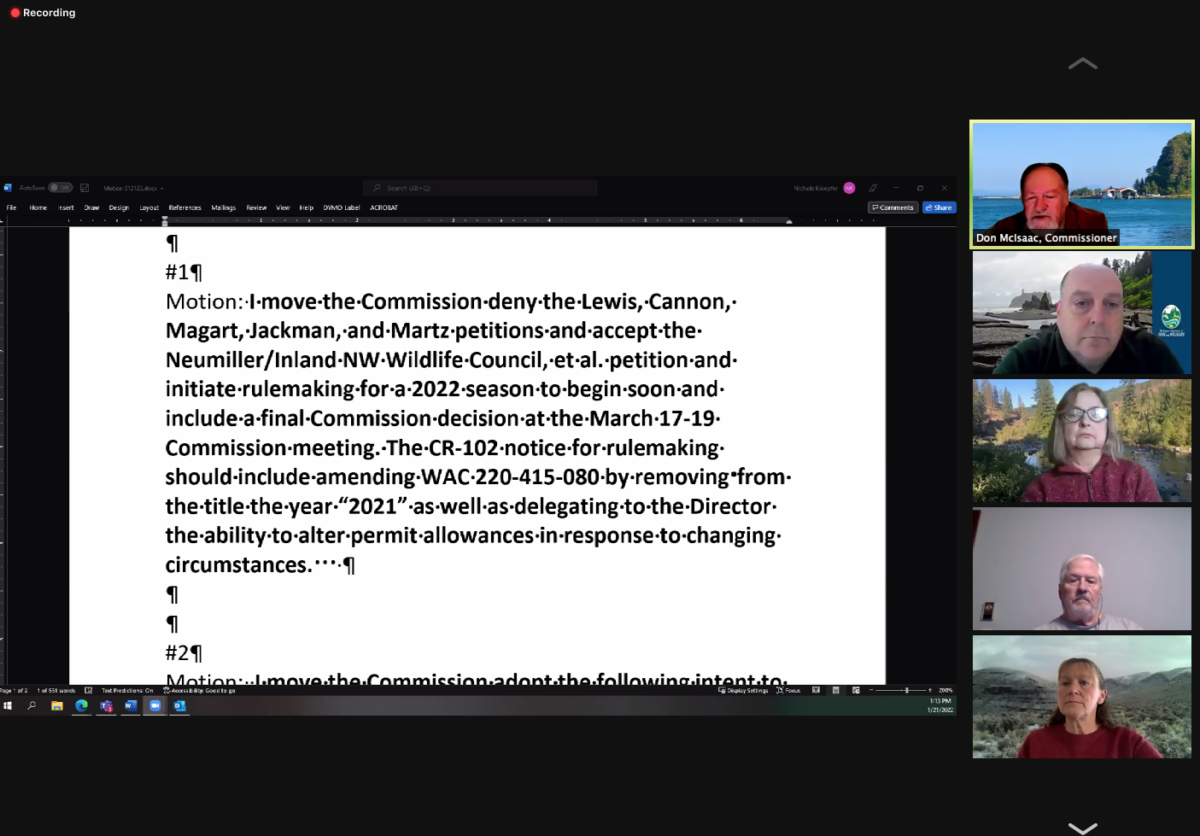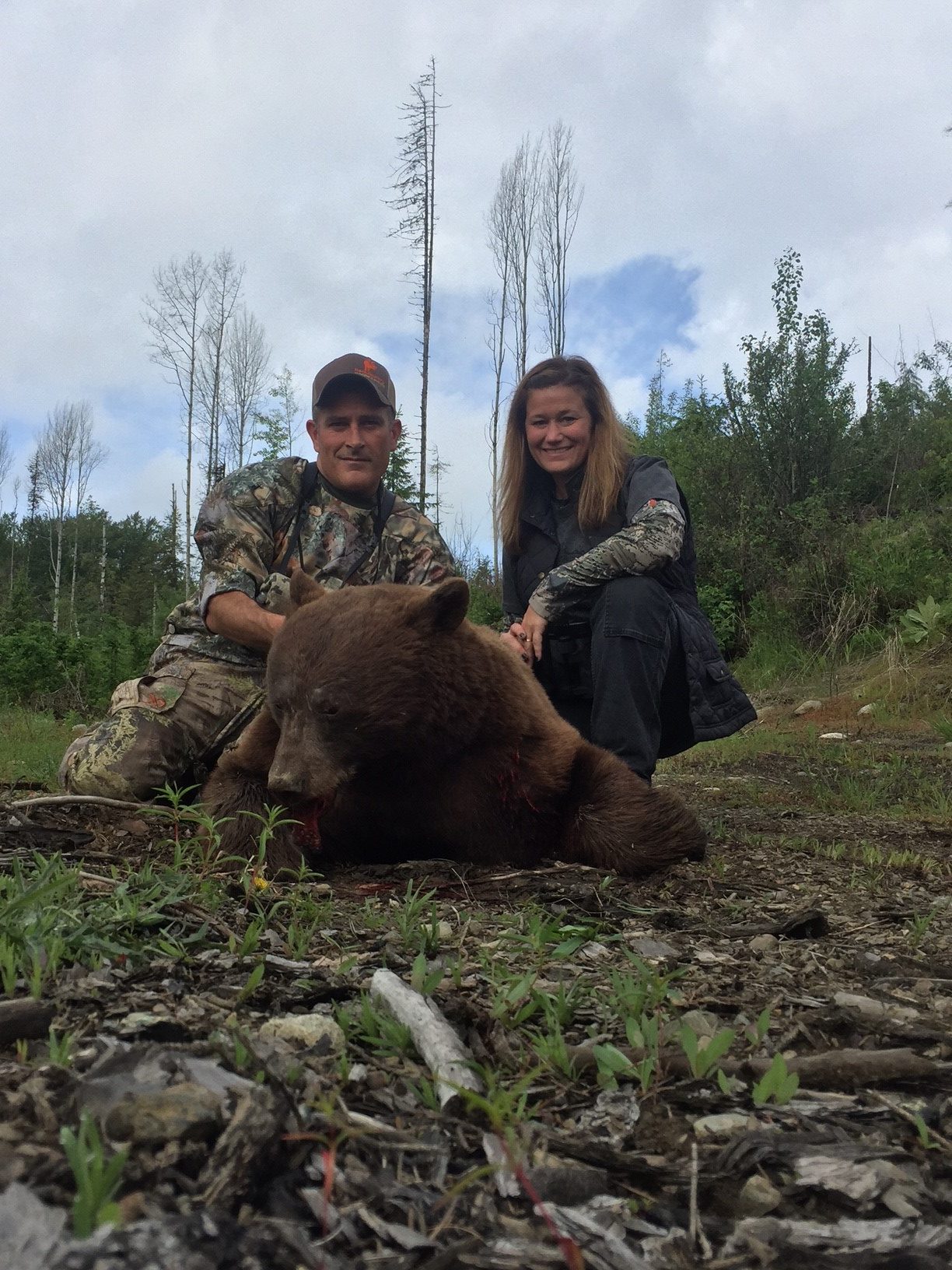Editor’s note: Updated 6:15 p.m., January 21, 2022.
In a 4-3 vote this afternoon, the Washington Fish and Wildlife Commission accepted one of six spring black bear permit hunting petitions and moved to “initiate rulemaking for a 2022 season to begin soon and include a final Commission decision at the March 17-19 Commission meeting.”

The vote follows their 4-4 tie last November that otherwise paused this year’s season and led to massive outcry among Evergreen State hunters and sportsmen across the West and beyond, as well as huge pressure from the other side of the matter.
While another vote will still be taken by the commission in two months – and there were heavy suggestions it could face a different citizen panel – in the lead-up today, WDFW Director Kelly Susewind said that with how the rulemaking process works in state government, it’s possible hunting could begin in early May instead of the otherwise scheduled April 15, providing a “meaningful season” for those who might be drawn for the limited-entry hunt. A total of 664 tags had been proposed for this year.
Central Washington hunting community representative Rachel Voss was “ecstatic” with the vote and “really proud of the work everyone” had done to get to this point since last fall. But she also warned hunters that this was just the beginning as antihunting elements locally and nationally would be redoubling their efforts, so it was important for us to stay engaged. The advice was echoed by a well-informed source who indicated it was one thing to create action alerts and quite another to be relevant in Olympia.
The primary name on the commission’s accepted petition was that of Marie Neumiller, executive director of the Inland Northwest Wildlife Council of Spokane, but she spread the credit for its success far and wide.
“This petition was born from hundreds of hours of conversations surrounding the spring bear permit season,” she said. “The Inland Northwest Wildlife Council is grateful to everyone who guided, signed on, and supported our petition. This shows what is possible when we set our minor differences aside and share our collective voice. We appreciate that the commission took our concerns to heart and voted to take the next steps. We look forward to the hearing in March that will hopefully close the loophole and encourage transparent public notice when considering future spring bear seasons.”
Cosignatories included Backcountry Hunters and Anglers, MeatEater, Wenatchee Sportsmen Association, Hunters Heritage Council, Washingtonians for Wildlife Conservation, Inland Empire Chapter of the Safari Club and Blood Origins.
In a press release, WDFW reported it plans to initiate a spring bear rule-making proposal “soon,” a process that involves filings with the state code reviser, public comment and hearings, and that more information would be available here “in the coming weeks.”
Commissioner Don McIsaac made the motion to both accept the petition from Neumiller et al, and deny five other petitions from local hunters.
He said the one petition essentially achieved what the others asked for, and stated that he still didn’t believe the hunt amounted to a conservation risk for black bears, nor that there was a high risk of litigation over holding it.
Commissioner Kim Thorburn of Spokane seconded his motion, and also voting in favor of it was Vice Chair Molly Linville and Commissioner Jim Anderson.
Thorburn spoke to a letter she received that told her the commission had made a mistake but here was an opportunity to correct it.
“We used a technicality and closed a season, and in my perspective, to accomplish a policy change,” she said.
The commission’s choices with the petitions boiled down to accept, amend or deny.
Voting against were Chair Larry Carpenter and Commissioners Barbara Baker and Lorna Smith.
Baker and Smith moved and seconded a striking/substitute motion that would have killed McIsaac’s motion, but it was defeated on the same 4-3 breakdown.
Carpenter called the motion to accept the Neumiller petition “very inappropriate,” arguing that sacrificing one spring bear hunt while more information on the hunt and species is gathered this year for a decision next fall was the “right path” for ensuring continuity of the season in the future.
It was an echo of his November no, and for this go-around, the lifelong hunter who lives in Mount Vernon said the outcome would be “ill-timed” and create a “significant image problem” and a “black eye” to the commission.
Baker worried about “ignoring the public,” saying accepting the petitions amounted to “overriding strong objections of the hunt” before going through December 2020’s commission-promised deep dive into the hunt.
(McIsaac and Thorburn argued the dive had in part occurred with “voluminous” presentations from WDFW staff in late October and mid-November, and a wildlife committee meeting.)
Smith said she had “deep concerns” about how not only the public would react but state lawmakers as well. There are now four bills in Olympia that set the board in their sights, including three sponsored by legislators who chair committees WDFW legislation goes through, which Baker – a retired state capitol hand – said were tantamount to “votes of no confidence.”
Smith warned that hunters should not get their hopes up too high either. She said today’s vote would not establish a 2022 spring bear season, but was a “narrow opportunity” to initiate rulemaking to potentially allow some semblance of a hunt.
Both Smith and Baker suggested there were also pending commission appointments from the Governor’s Office, which could swing March’s vote the other way.
But Anderson, the retired longtime executive director of the Northwest Indian Fisheries Commission who dialed into Zoom all the way from Costa Rica during a long-planned trip, said he didn’t think WDFW’s panel could tell where legislators might land with their bills – it’s a short 60-day session with other priorities – and he said he didn’t know if in fact there were any new commissioners in the wings.
It has now been 385 days since Eastern Washington had a third representative on the commission, as required, and 39 days since Fred Koontz resigned, setting up today’s far more decisive decision than November’s sister kisser. The tie essentially prevented changing the date in the hunt’s enabling statute from 2021 to 2022.
Anderson said he also didn’t believe there was any conservation concerns about the state bear population, and while he acknowledged differences of opinion around the science, said holding the hunt was consistent with WDFW’s statutory mandate to conserve the resource and provide opportunity.
After the vote on the petitions, in other commission business this afternoon, a McIsaac motion “declaring an intent to conduct a comprehensive review of a spring bear hunting policy starting in spring 2022” also passed unanimously, according to WDFW.





